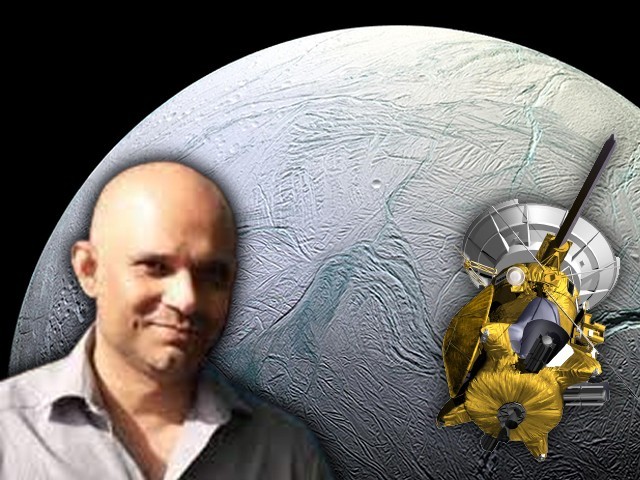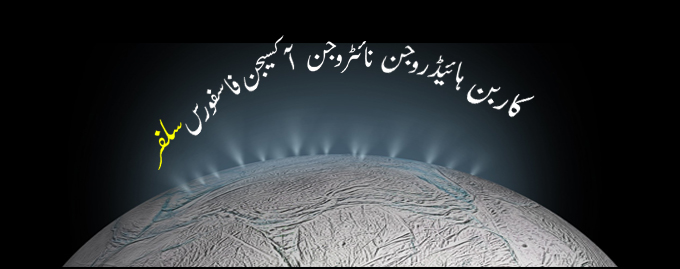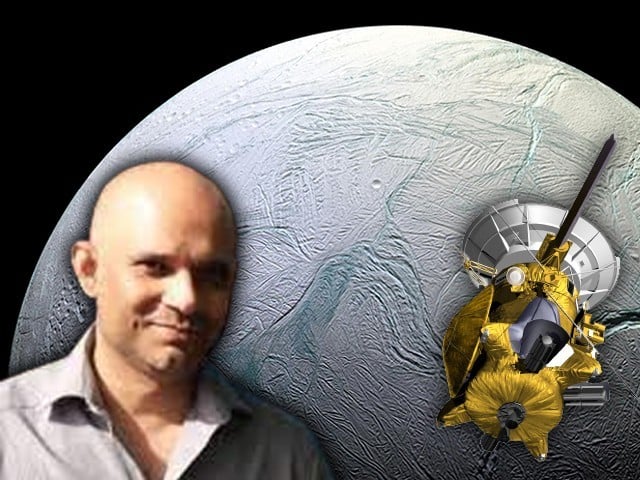
Dr Nazir Khawaja and his colleagues have discovered phosphorus on Saturn’s moon Enceladus. Photo Collage: Jahangir Akhtar Ali
Karachi: Pakistani scientists are part of an important team that has discovered an essential element for life in our solar system.
Dr. Nozeer Khawaja, who is associated with the University of Freire, has played an important role in this team that is looking for signs of life in the universe. They have discovered phosphorus on Saturn’s icy moon, Enceladus, which is an essential but rare element for life.
University of Freiburg Professor Frank Postberg is the head of an international team of scientists who have reviewed data from NASA’s Cassini spacecraft for several years and have shown that deep inside the Enceladus moon there is a vast ocean of phosphorus in the form of phosphates. Is. This research has been published in the prestigious scientific journal ‘Nature’ on Wednesday 15 June 2023.
“Our results show that Enceladus’ seawater contains large amounts of phosphates, and our geochemical experiments show why Enceladus’ oceans are richer in this important compound than Earth’s oceans,” Professor Frank Postberg told Express. told.
The six main components of life are present in one place
Phosphorus is also a rare element on our earth that not only makes the soil fertile but also plays a fundamental role in the formation of the DNA and its associated RNA, the book of life. This is why the icy Enceladus may be the most suitable candidate for life.
“After the discovery of phosphate on Enceladus, the six elements essential for life are complete, including carbon, hydrogen, nitrogen, oxygen, phosphorus and sulfur,” study co-author Dr. Nozeer Khawaja said in an email. told Express.

We know that phosphorus is like the most basic building block for life, which is essential for life in addition to DNA.
After this (phosphorus) discovery, Saturn’s moon has become an important location for the search for extraterrestrial life. What is needed now is to send new space missions equipped with advanced instruments and technology so that we can really know how much and how suitable it is for life in the ocean,’ added Dr Nozeer Khawaja.
Cassini spacecraft
Just 500 km wide, Enceladus is the sixth largest moon of Saturn. Its conquest is credited to NASA’s spectacular space mission, Cassini, which reached beautiful ringed Saturn in 2004. Cassini took a total of 453,048 images of the planet and its moons, making 162 orbits of the planet’s dozens of moons that were part of the project. The same spacecraft helped us discover six more moons. Above all sent 635 GB data which is still under consideration. In the light of this data and information, we earthlings wrote not one or two but 3948 research papers. Then, in 2017, it was deliberately pushed into Saturn’s atmosphere on its final journey, where it crashed. But remember that Cassini’s data will keep scientists engaged in research and discovery for many more years.
The ‘Cosmic Dust Analyzer’ or CDA on Cassini revealed in 2015 that Enceladus is not just an ice ball, but a vast ocean beneath it. Then there are chimney-like vents on the floor of the moon’s sea, from which the ejected icy particles rise up like spray. The icy mantle of the moon is cracked from place to place. The icy particles are coming out, along with some gas, and the spectrometer on Cassini’s CD instrument has collected their details.
After a long study of this data, Dr. Frank, Noreez Khawaja and other experts carefully observed that there are hints of phosphates in some of the arms and this is the reason why the discovery of phosphorus on Enceladus has now been officially announced.
It should be noted that Dr. Nozeer Khawaja has an international reputation in the field of astrobiology. Previously, a molecule suitable for life has also been discovered on Enceladus. His research papers have also been published in Nature and Monthly Notices of the Royal Astronomical Society.
Born in Wazirabad, Dr. Nozeer Khawaja completed his Masters in Space Science and Astronomy from Punjab University and joined the Geological Research Institute of the same university after his doctorate in Earth Sciences from Heidelberg University in Germany.
It should be noted that Dr. Noreez Khawaja has also played an important and fundamental role in establishing the Department of Astrobiology at the University of Freiburg in Berlin. Now he is also working on NASA’s Europa Space Clipper mission. Apart from this, he is also involved in research issues on the Destiny Plus mission of the Japan Space Agency (JAXA).
Dr. Norez is also a pioneer in biology experiments on the International Space Station.
(function(d, s, id){
var js, fjs = d.getElementsByTagName(s)[0];
if (d.getElementById(id)) {return;}
js = d.createElement(s); js.id = id;
js.src = “//connect.facebook.net/en_US/sdk.js#xfbml=1&version=v2.3&appId=770767426360150”;
fjs.parentNode.insertBefore(js, fjs);
}(document, ‘script’, ‘facebook-jssdk’));
(function(d, s, id) {
var js, fjs = d.getElementsByTagName(s)[0];
if (d.getElementById(id)) return;
js = d.createElement(s); js.id = id;
js.src = “//connect.facebook.net/en_GB/sdk.js#xfbml=1&version=v2.7”;
fjs.parentNode.insertBefore(js, fjs);
}(document, ‘script’, ‘facebook-jssdk’));



